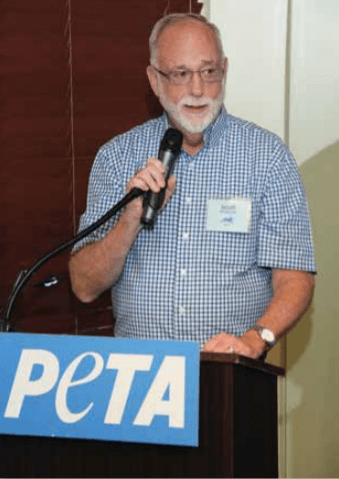This article was originally printed in PETA’s Augustus Club newsletter for our legacy society members.
Every year, PETA is at the forefront of achieving victories for animals. And every victory is important and celebrated, from the smallest mouse spared a horrific death in a glue trap to the thousands of cows, pigs, chickens, and fish whose lives are saved every time someone goes vegan. None of these achievements would be possible without our generous supporters—especially our Augustus Club members.
Since 1983, Scott Anderson has led PETA’s fundraising efforts, which have enabled it to become the largest and most effective animal rights organization in the world, with more than 6.5 million members and supporters worldwide. Over the years, his responsibilities have grown to include spearheading and directing the development programs for PETA entities worldwide.

Augustus Club: How did you become involved in animal rights?
Scott Anderson: I came to animal rights from the civil rights movement. For many years in the late 1970s and early 1980s, I was a gay rights activist and staff member at what was then the only national LGBT organization in the country. I was deeply committed to fighting injustice, and while I was initially active only in the defense of human rights, the animal rights ethic began to appeal to me greatly, because it is, as I see it, more comprehensive. I had always loved animals and had grown up with dogs, so the fight for animal rights was a natural and rational extension of that commitment—one that rang true for me and just felt right.
AC: When did you join the PETA staff, and what was your first position?
SA: Luckily for me, PETA was in existence when my personal lightbulb came on, and I landed my dream job soon thereafter. I started working for PETA in 1983, when there was a grand total of four people on staff (along with a handful of volunteers).
My title has changed several times over the past 35 years, but my role has always been to find ways to raise the funds that PETA needs in order to challenge and stop every type of animal exploitation and abuse. Raising funds for a social justice issue like animal rights, which is still perceived by many people as a controversial cause, isn’t easy by any means. But it also comes with many rewards, including getting to work with the smartest, most fearless colleagues on the planet.
AC: Describe a facet of your job that makes you especially happy.
SA: I love getting to know PETA members. They are an extraordinarily diverse lot, often with different motivations and goals. But the common thread seems to me to be the focus on doing what is right, first and foremost, for animals’ sake. Some donors may initially be motivated by a single aspect of PETA’s work, such as promoting vegan living, stopping animal tests, rescuing animals from zoos and circuses, or helping companion animals. But they soon come to appreciate the commonality and the compassion that link all the campaigns. And above all, PETA donors share three important traits: They feel deep empathy for animals, they want to create a kinder world, and they’re willing to use their time, energy, and money to do it. What could be better than that? These are the best, most decent people on Earth!
It’s my good fortune to be able to help them realize their goal of making a difference for animals. Sometimes I work with members who have underwritten a certain PETA project—say, rescuing a bear from a roadside zoo or sponsoring the development of a new non-animal test method. My favorite thing is to be able to pick up the phone and tell them, “Mission accomplished! And it’s all because of your support!” Their excitement at hearing the news always puts me on cloud nine.
I feel the same way about our staff. Our Development Department is made up of brilliant, kind, generous, hardworking, dedicated people whose number one goal is to end animal abuse. I get the same kind of “high” from knowing that I’m playing a role in helping them reach their goals as well.
AC: In your opinion, what makes PETA more effective than other animal groups or social change organizations?
SA: I would say foresight and philosophical consistency, the refusal to give up or take “no” for an answer, and the ability to scare the living daylights out of both animal-abusing Fortune 500 companies and individual animal abusers.
Also, PETA is campaigning for change on a global level by coordinating campaigns with PETA entities in Asia, Australia, France, Germany, India, the Netherlands, and the U.K. For example, each affiliate has a campaign against Louis Vuitton’s (LVMH) use of exotic skins. Those campaigns have involved releasing a video exposé of crocodile farms in Vietnam that supplied skins to the label, disrupting an LVMH annual meeting in Paris, protesting in front of Louis Vuitton stores in fashion capitals all around the world, and pushing for bans on the importation of reptile skins, such as the one that PETA India recently helped persuade the Indian government to implement. Together, PETA entities worldwide can pressure the global marketplace to break the economic chain of animal exploitation.
Another important factor in PETA’s success is the ability to bring about small improvements while simultaneously working toward larger goals, for example, improving conditions for animals on factory farms while also persuading millions of people to go vegan—or reducing the number of animals used in chemical testing while also funding the development of non-animal tests that will eliminate the use of animals altogether.
AC: Are you optimistic about the potential for long-term changes in society’s treatment of animals?
SA: Without a doubt. Look at how unacceptable it has become to exploit animals for entertainment, thanks to the huge impact that PETA has had. Ringling Bros. circus was forced to close, and SeaWorld’s stock drops even further every year. And the market for vegan food is skyrocketing now that there’s hardly anyone in the industrialized world who hasn’t seen footage from PETA’s eyewitness exposés of factory farms and slaughterhouses. I am more hopeful today than I have ever been in my entire life!
AC: Has there been a particular victory in PETA’s history that took you by surprise?
SA: I was amazed—and thrilled, of course—when Idaho’s “ag-gag” law was declared unconstitutional after PETA and others sued the state. I remember thinking, “Wow, this is a watershed moment. I’m watching history in the making.”
AC: Is there one goal in particular that you think will be achieved in your lifetime?
SA: I’m so impressed with the progress that PETA’s scientists are making in the replacement of animal tests with non-animal methods. I think that animal testing will be wiped out within the next 20 years for a combination of ethical, scientific, and economic reasons.






